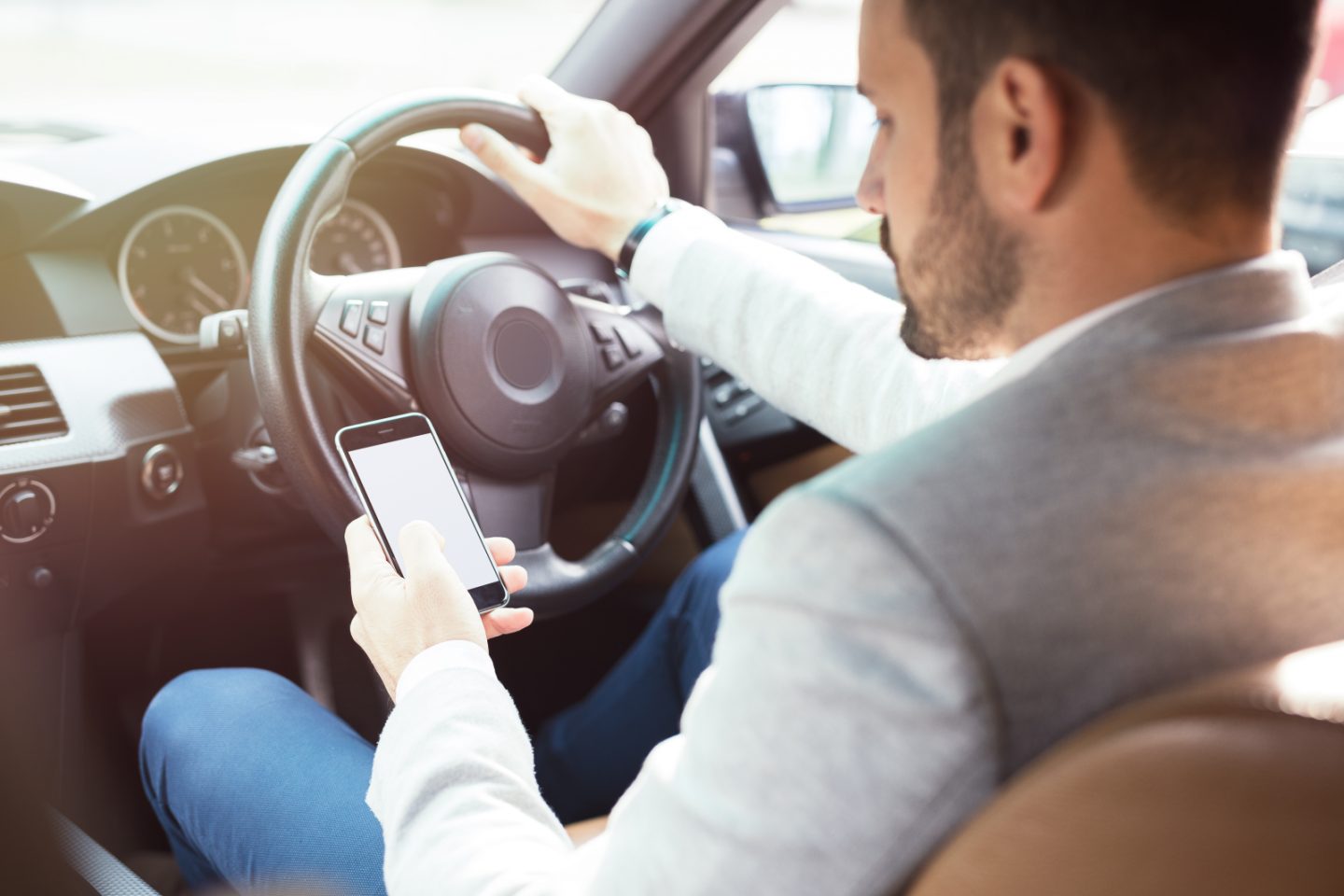The Transport Secretary at the time, Chris Grayling, said that increasing the penalties would be a “strong deterrent”. However, stiffer penalties have had no apparent positive effect on phone-use by drivers. In a RAC survey of over 1,800 U.K. motorists (RAC Report on Motoring 2018), 16% considered it safe to text, email or post on social media while driving, and 33% thought these behaviours were fine whilst the vehicle was stationary (e.g. at traffic lights). 25% thought it was OK to make or receive calls during driving, and nearly 40% considered it acceptable to do so whilst stationary. These figures actually show an increase from 2017 in the overall use of phones by drivers. This increase is more marked in drivers aged between 25-44 years, with 47% of them admitting to using a hand-held phone (a 7% increase since 2017).
The scientific evidence on whether phones distract drivers is quite unequivocal: over 20 years of research has shown that conversing on a mobile phone significantly worsens a driver's ability to detect and react to hazards. This conclusion has been drawn from studies around the world, using experiments, simulators, test-tracks and measurements of drivers' behaviour in real-world traffic conditions. Engaging in a conversation on a phone not only slows drivers' response times to hazards, it can even affect their ability to detect them altogether. In our own research, we have recorded people's eye-movements while they try to detect hazards in driving videos. Sometimes people fail to respond at all to a hazard, even though the eye-tracker shows clearly that they were actually looking directly at it. These so-called "looked but failed to see" errors are an example of a phenomenon called "inattentional blindness": because the driver's attention is taken up with the conversation, the hazard does not reach conscious awareness, even though it is in full view.
Our research, and that of many others, shows that these effects are just the same with hands-free phones as they are with hand-held ones (e.g. Atchley et al, 2017). It's true that holding a phone in your hand is likely to affect your control of the vehicle. However the real danger arises from the fact that phone-use distracts you from the most important aspect of driving - looking for hazards.
There is absolutely no scientific justification for banning hand-held phones but not hands-free ones, because they produce precisely the same impairments in drivers. Unfortunately the current law, prohibiting only hand-held phone-use, means that the public are misled into thinking that hands-free phones are safe. This confusion is compounded by the proliferation of hands-free "infotainment" systems in cars. These systems are unsafe for the very same reasons as hands-free phones. This is why we advocate extending the current law to include hands-free phones. Opponents of this suggestion argue that such a law would be unenforceable; however we believe it would at least send out a clear message to the public, to make them aware of the dangers of hands-free phones.
If phone-use dangerously impairs driving performance, why do drivers do it? Quite apart from thinking that they won't be caught (because of the lack of traffic policing), there are a number of psychological phenomena that conspire to fool drivers into thinking they can safely combine phoning and driving.
Firstly, most drivers think they are better than average. Consequently they believe that they can combine phoning and driving, even if they notice that other drivers clearly can't. This is reinforced by the fact that, because phone-using drivers lack awareness of their surroundings, they don't notice their own mistakes and so they think they can cope with the distraction better than they really can. People also believe that they are less likely than other drivers to be involved in a crash (and more likely to survive if they are). These delusions are bolstered by "protective beliefs" that people unconsciously develop in order to defend their risky actions: phone-users are likely to say things like "I only phone when the traffic conditions are safe enough for me to do so", or "I'm a very experienced driver, so I can cope with using a phone whilst driving". Our most recent research (Briggs, Hole and Turner 2018) suggests that phone-using drivers rely excessively on their expectations about what is likely to happen in traffic situations. Most of the time, they can get away with doing this, but occasionally the unexpected happens - and when it does, the distracted driver is likely to come unstuck.
Finally, research shows that people are very poor at estimating risk. Drivers place more weight on their own personal experiences (that they have used a phone many times without crashing) than on official claims that using a mobile phone increases your risk of a crash fourfold. This makes some sense, because the quarter of a million road casualties every year are distributed over 38 million drivers: you are highly unlikely to have a fatal crash on any one particular trip. However, last year over 5,300 people were killed or seriously injured every day. Five people will die on the roads today, and the use of mobile phones whilst driving increases the chances that one of them will be you or someone you care about.
References
- Atchley, P., Tran, A. V., & Salehinejad, M. A. (2017). Constructing a publicly available distracted driving database and research tool. Accident Analysis and Prevention, 99, 306–311.
- Briggs, G. F., Hole, G. J., & Turner, J. A. (2018). The impact of attentional set and situation awareness on dual tasking driving performance. Transportation Research Part F: Traffic Psychology and Behaviour, 57, 36-47.
- RAC report on motoring (2018). Available from: https://www.rac.co.uk/report-on-motoring?utm_medium=referral&utm_source=mediacentre&utm_campaign=reportonmotoring
Dr. Gemma Briggs
Senior Lecturer in Psychology at the Open University
Dr. Graham Hole
Senior Lecturer in Psychology at the University of Sussex
